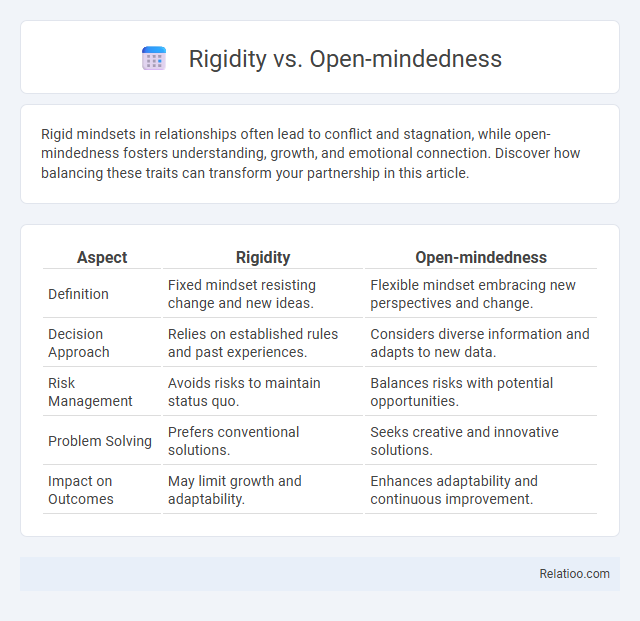Rigid mindsets in relationships often lead to conflict and stagnation, while open-mindedness fosters understanding, growth, and emotional connection. Discover how balancing these traits can transform your partnership in this article.
Table of Comparison
| Aspect | Rigidity | Open-mindedness |
|---|---|---|
| Definition | Fixed mindset resisting change and new ideas. | Flexible mindset embracing new perspectives and change. |
| Decision Approach | Relies on established rules and past experiences. | Considers diverse information and adapts to new data. |
| Risk Management | Avoids risks to maintain status quo. | Balances risks with potential opportunities. |
| Problem Solving | Prefers conventional solutions. | Seeks creative and innovative solutions. |
| Impact on Outcomes | May limit growth and adaptability. | Enhances adaptability and continuous improvement. |
Understanding Rigidity and Open-mindedness
Rigidity in thought processes limits adaptability and hampers problem-solving by enforcing fixed beliefs and resistance to new ideas. Open-mindedness enhances cognitive flexibility, promoting creativity, learning, and effective decision-making through acceptance of diverse perspectives. Balancing rigidity and open-mindedness optimizes mental resilience and fosters personal and professional growth.
Defining the Spectrum: From Rigid to Open
Rigidity represents a fixed mindset characterized by resistance to change and adherence to established beliefs, while open-mindedness embraces flexibility, curiosity, and a willingness to consider diverse perspectives. The spectrum between these extremes includes varying degrees of adaptability, critical thinking, and receptiveness to new information. Understanding this continuum aids in balancing steadfast principles with openness to innovation and growth.
Psychological Roots of Rigidity
Psychological rigidity stems from cognitive inflexibility often linked to anxiety, fear of uncertainty, and a need for control rooted in early life experiences or trauma. Neural patterns in the prefrontal cortex may reinforce rigid thinking by limiting adaptability and response to novel information. Therapeutic interventions targeting cognitive restructuring and mindfulness can reduce rigidity by enhancing open-mindedness and emotional regulation.
Benefits of Embracing Open-mindedness
Embracing open-mindedness enhances adaptability and fosters innovative problem-solving by encouraging diverse perspectives and continuous learning. It promotes effective communication and collaboration, leading to improved relationships and team dynamics in both professional and personal settings. Open-minded individuals are better equipped to navigate change and uncertainty, driving growth and resilience in rapidly evolving environments.
Consequences of Rigid Thinking
Rigid thinking limits Your ability to adapt to new information and solve problems effectively, often leading to missed opportunities and increased stress. It can cause strained relationships due to an unwillingness to consider others' perspectives, hindering collaboration and growth. Over time, persistent rigidity may result in stagnation both professionally and personally, reducing overall success and satisfaction.
Factors Shaping Cognitive Flexibility
Cognitive flexibility is shaped by a combination of genetic predispositions, environmental influences, and lifelong learning experiences that encourage adaptive thinking. Exposure to diverse perspectives and problem-solving challenges enhances neural plasticity, promoting open-mindedness and reducing rigidity. Stress and rigid cognitive patterns can limit flexibility, while supportive social environments and continuous mental training foster adaptive and flexible cognition.
Rigidity vs Open-mindedness in Decision-Making
Rigidity in decision-making limits Your ability to adapt to new information, resulting in missed opportunities and inflexible problem-solving. Open-mindedness promotes critical thinking and creativity, allowing for diverse perspectives and more effective solutions. Balancing these traits helps optimize decision outcomes while maintaining necessary structure.
Cultivating Open-minded Habits
Cultivating open-minded habits enhances cognitive flexibility, encouraging individuals to embrace diverse perspectives and adapt to new information. Developing curiosity and active listening skills fosters empathy and reduces cognitive biases, promoting innovative problem-solving and effective decision-making. Practicing mindfulness and reflective thinking supports the transition from rigidity to open-mindedness, enabling personal growth and improved interpersonal relationships.
Overcoming Cognitive Rigidity
Overcoming cognitive rigidity involves cultivating open-mindedness to enhance mental flexibility and adaptive thinking. Techniques such as perspective-taking, mindfulness meditation, and exposure to diverse ideas can reduce rigid thought patterns and promote creative problem-solving. Emphasizing neuroplasticity research reveals that the brain's ability to reorganize itself supports breaking free from fixed cognitive frameworks.
The Role of Open-mindedness in Personal Growth
Open-mindedness plays a crucial role in personal growth by fostering adaptability and a willingness to embrace new perspectives. Unlike rigidity, which often limits learning and stifles creativity, open-mindedness encourages You to explore diverse ideas and experiences that challenge existing beliefs. Cultivating this mindset leads to enhanced problem-solving skills, emotional resilience, and continuous self-improvement.

Infographic: Rigidity vs Open-mindedness
 relatioo.com
relatioo.com